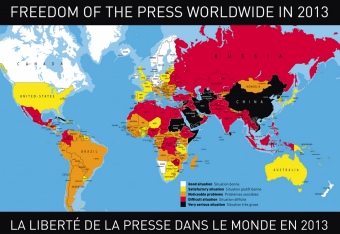Islamic Republic Ranks Eighth Worst on Press Freedom Index
 Global press freedom fell to its lowest level in over a decade in 2013, as hopes raised by the Arab Spring were further dashed by major regression in Egypt, Libya, and Jordan, and marked setbacks also occurred in Turkey, Ukraine, and a number of countries in East Africa. In another key development, media freedom in the United States deteriorated due primarily to attempts by the government to inhibit reporting on national security issues.
Global press freedom fell to its lowest level in over a decade in 2013, as hopes raised by the Arab Spring were further dashed by major regression in Egypt, Libya, and Jordan, and marked setbacks also occurred in Turkey, Ukraine, and a number of countries in East Africa. In another key development, media freedom in the United States deteriorated due primarily to attempts by the government to inhibit reporting on national security issues.
Meanwhile, as a result of declines in democratic settings over the past several years, the share of the world’s population that enjoys a Free press remained at 14 percent, meaning only one in seven people live in countries where coverage of political news is robust, the safety of journalists is guaranteed, state intrusion in media affairs is minimal, and the press is not subject to onerous legal or economic pressures.
In the Middle East and North Africa, 1 country (5 percent) was ranked in the Free category, 4 (21 percent) were designated Partly Free, and 14 (74 percent) were assessed as Not Free. Similarly, in terms of population, 2 percent of the region’s people lived in Free media environments, 14 percent lived in Partly Free countries, and the vast majority, 84 percent, lived in countries or territories that were designated Not Free. The regional average score had improved significantly in 2011, particularly in the legal and political categories, due to changes associated with the Arab Spring uprisings. However, the following year featured serious backsliding, and this continued in 2013, driven almost entirely by declines in the political category.
The world’s eight worst-rated countries, with scores of between 90 and 100 points, remain Belarus, Cuba, Equatorial Guinea, Eritrea, Iran, North Korea, Turkmenistan, and Uzbekistan. In these states, independent media are either nonexistent or barely able to operate, the press acts as a mouthpiece for the regime, citizens’ access to unbiased information is severely limited, and dissent is crushed through imprisonment, torture, and other forms of repression. In 2013, conditions remained largely stable in the majority of these countries, although slight improvements could be seen in some due to the growing ability of citizens to access alternatives to state propaganda, via satellite television, internet-based news platforms, or the circulation of thumb drives and DVDs. The only country in this cohort to have registered a significant shift in recent years is Cuba, whose score improved from 92 to 90 points in 2013 based on a decrease in cases of extralegal harassment and imprisonment, as well as a positive change in the system of granting exit visas, under which a prominent blogger was allowed to travel freely outside the country. And after several years of decline in Iran, the country’s score bounced back from 92 to 90 points in 2013 based on a relative improvement in the number of imprisoned journalists and reporters’ increased willingness to push the boundaries on political coverage, including on the June presidential election.1
Opinions contained within the article is of the author and not necessarily representative of Iran
Iran Roundtable publishes these articles for the sole purpose of disseminating information to stimulate discourse, awareness and diversity of issues.
- 1. PRESS FREEDOM IN 2013: Media Freedom Hits Decade Low
Karin Deutsch Karlekar and Jennifer Dunham
